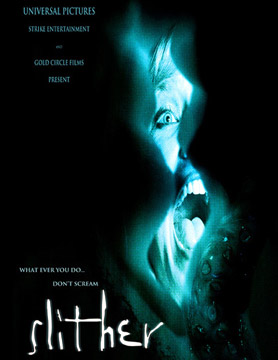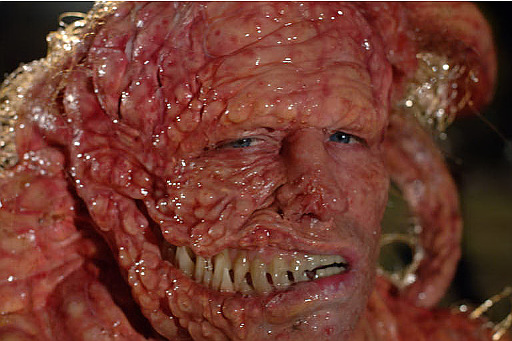
It’s funny how things work out. In our very first San Diego Comic Con half a decade ago or so, we did very little press because we were pretty much considered a pile of crap by the studios. Now, we’re kind of snooty when it comes to doing press at the con for fear of overloading (and because other sites tend to upload the info one millisecond after it happens). Way back, we covered one movie pretty hard, The Specials. That film’s writer and one of its stars, James Gunn, has been a friend and a favorite ever since. They even mentioned us on the DVD commentary for that film, something which alarmingly is the only mention of the site on DVD to this day unless you count the little-seen MOVIE INSIDER DVD.
Gunn’s come a long way since that superhero spoof where he played Minute Man. Two Scooby-Doo movies, one giant Dawn of the Dead sized hit, and now Slither, his ode to body horror with Nathan Fillion and Michael Rooker.
In the nuttiness of Comic Con ’05 Dave Davis and I doubleteamed the writer/director.
Then we interviewed him.
Nick: I guess the basic thing is, how does Slither fit into the horror genre in particular?
Gunn: Well, when I wrote Dawn of the Dead, I wanted to do something that was gritty, that was sort of in line with the 70s horror movies that I liked, and I think it came out a lot like that. When I wrote Slither, I think it started out as… I wasn’t as sure exactly what it started out as, I just wanted to find a horror movie that I really thought could be fun and entertaining throughout, and also have a fair amount of emotion to it and humor. And as I was getting into it, I really discovered what I was missing in horror movies today, that sort of big over-the-top extreme fun feeling of the horror movies from the 80s. Namely Carpenter’s The Thing, Cronenberg’s The Fly, The Brood, and It Came From Within and Videodrome, Re-Animator… gooey, gory, oozy, yucky movies. I mean, there’s a lot of great movies that come out, but I’ve had it with the PG-13 horror movies. I think it’s great that 13-year-old girls have a horror movie to go out and see, that’s who The Grudge is for, and that’s fantastic, but I think for me and for a lot of guys, that’s not really the horror movies we want to see. And I’ve had it with these sort of creepy, not-really-going-all-the-way Japanese-inspired horror films that really aren’t… they take away some of the gooiest goriest stuff out of those Japanese horror films too. People are afraid to go all the way and have a monster movie. And this is a monster movie. I just felt like, frankly, that I was filling a hole, there was a big space that horror fans needed to have something, and that’s what Slither is. I really don’t think there’s anything else like it that’s being made or has been made recently, definitely not from a major studio.
Dave: Was it a tough sell for them?
Gunn: No, it was weird – I started writing this movie just a little over a year ago. Dawn of the Dead came out, I took a break and started writing something. I wrote this thing in two months I think, and shopped it around and right away a few places wanted to buy it, and we ended up going with Gold Circle and Universal, Gold Circle because I was gonna have complete freedom over everything, and Universal because I’d worked with them before on Dawn of the Dead, I think they know how to sell horror movies better than anybody else, and I like them. So it just happened really quickly. I sold it basically the morning that I sent it out.
 Dave: When did the title come, first?
Dave: When did the title come, first?
Gunn: Yeah! Before Dawn went into production I started writing another movie called Slither that actually was much different from what this Slither is, but some things remain the same. I’ve always had this image in my head of these slurpy parasites going into somebody’s mouth and flapping around while the girl has convulsions and her eyes flip into the back of her head. I always thought that was a cool image, and that was gonna be in that movie which I never finished, and it’s definitely one of the centerpieces of this film. So there were a few key visual images that I’ve wanted to put into something. I think this is a very visual film, and it really freaked me out because I’ve been a screenwriter, and I think my brain thinks visually before anything else. But when you’re a screenwriter you really have to think verbally so that you’re letting somebody else understand what you’re seeing, I don’t know if that makes any sense… With this screenplay I was able to just put down what it was, but in my head it was all planned out in terms of shots and visual images.
Nick: You were pretty sure you’d be able get the director to agree with most of your screenplay?
Gunn: [Laughs] Yeah, the director and the writer fought an awful lot, because the director was very likely to change dialogue on set, which is something this writer has always hated when other directors did, and this director did it just as much. Yeah, I did it a lot. I’m actually very free with that stuff, some dialogue is what it’s supposed to be, but the most important thing for me was to be able to create real characters with good performances in this otherwise kind of freaky, creepy over-the-top story. So by keeping these very real performances, we’re able to make people believe the crazy stuff all the more. So I really wanted to keep things real between the actors. I wouldn’t say we improvised, but keeping it real was always the first and foremost thing, and if there was something that wasn’t sounding natural I would change it all the time. And I think of jokes all the time, stuff that cracks me up.
Nick: What percentage of this would you say has the humor element to it? It’s a tough balance.
Gunn: It’s a real tough balance. I wouldn’t say this is a horror-comedy. It’s a horror movie first, 100%, with a lot of humorous elements. But I think a lot of it has the type of humor you’d see in a Cohen Brothers movie, or Bottle Rocket, the humor that comes from the characters and the way they interact, not humor that comes from joke, joke, punchline.
Nick: Like Re-Animator had comedic elements, but it certainly wasn’t a comedy.
Gunn: You know, I think tonally in some ways we’re similar to a big Re-Animator. But also The Fly, I think The Fly is a great example. The Thing is probably my favorite body horror film, and The Brood I love too… but The Fly is really unique in that Goldblum is so good in that movie, he really deserved an Oscar for the performance. So the performance was great, it was scary but there was humor, and there was also a lot of emotion. As stupid as that big fly looks at the end, I still feel sorry for it, it brings tears to my eyes when it puts that shotgun against its head, and it’s a big stupid puppet. And that’s just a testament to how great Cronenberg was with that movie, the fact that he’s able to have us care about the dumb puppet at the end.
Nick: Talk about having two super cult icons in the movie, one that’s just starting to get a footing in the consciousness, and then you have Rooker. How did things change once you got them in the film?
Gunn: You know, people are always saying this about their films, but I had really good people to work with, because what we were going through was so physically difficult, and we had really easy people to work with, between Elizabeth and Nathan and Michael and Gregg Henry. I had thought of Rooker from early in the script stage that he’d be a possibility for the role. I’ve always wanted to work with him, he’s one of my heroes, so I was really excited that he was able to do it and more excited that Universal wanted him to do it. Nathan I only knew from TV, but he fits the role like a glove. I never thought of him until someone sent me his headshot and said maybe you should think of Nathan Fillion. And I’m like “Holy shit, that’s the Firefly guy, that could work!” And he fits the role perfectly. The thing that changed was that we have a tight group of people that are all excited. The fact that they’re all here today is testament to that, I know Gregg Henry had another job he gave up, and Elizabeth is here and she’s never done anything like this.
